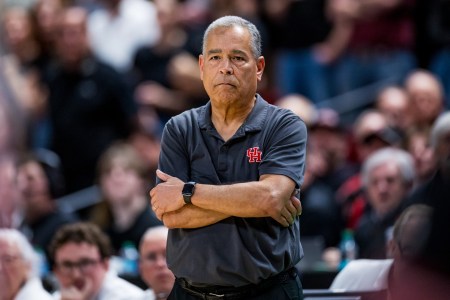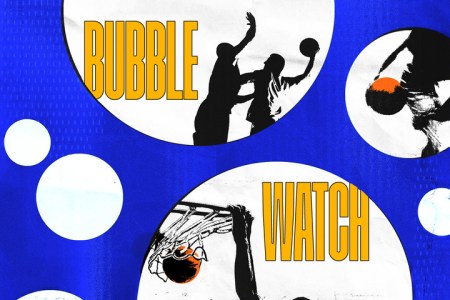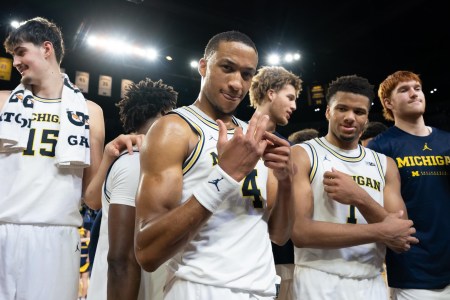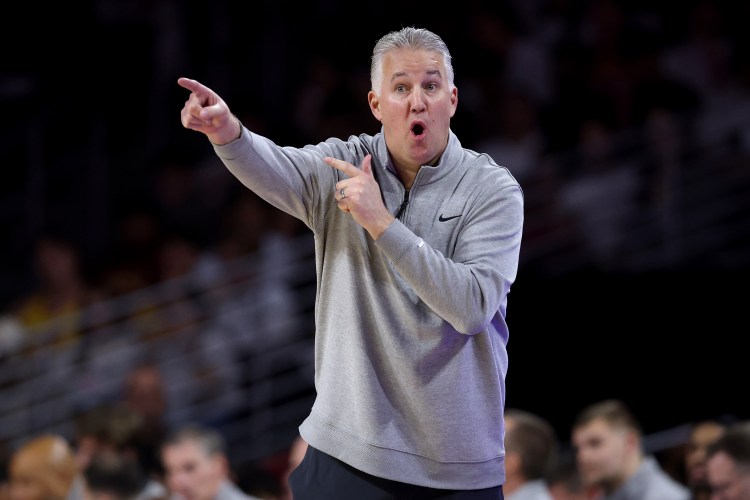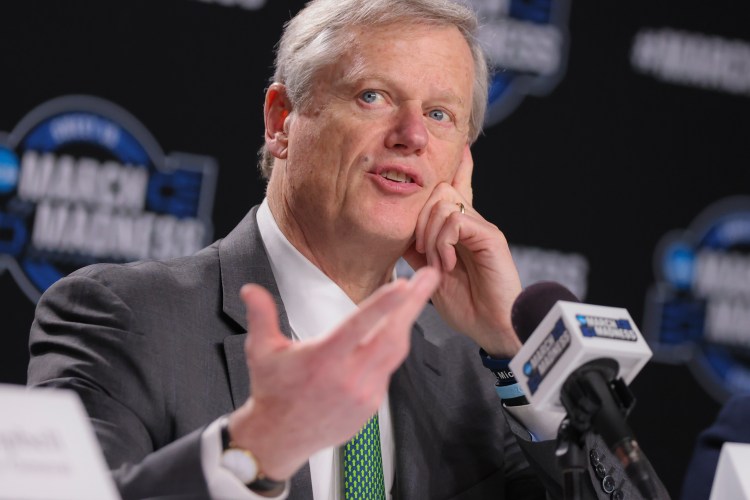TCU coach Jamie Dixon had a lot to fret about after his Horned Frogs lost 65-46 at home to Houston on Jan. 6. But instead of fixating on the three Houston players who scored in double digits, or the Cougars’ 8-for-19 performance from three-point range, Dixon found himself muttering aloud about Joseph (JoJo) Tugler, a 6-foot-8 sophomore forward who made one shot and scored three points. He did, however, have three blocks, two of which came rapid fire on back-to-back possessions early in the second half, sparking a Cougars run and sending them to the easy win.
“We talked about not shooting on [Tugler],” Dixon said. “I wrote it all over the board [Sunday] night, [Monday] morning, this afternoon, at halftime and before the game and still the message didn’t get through. So, give them credit for forcing us to do what we didn’t want to do.”
Tugler does a lot of things for Houston, but taking credit is usually not one of them. He is the seventh-leading scorer (5.8 points per game) for a team that has won its second straight Big 12 title and all but wrapped up a No. 1 seed to the NCAA Tournament. The program is loaded with stars, not only versatile scoring threats like L.J. Cryer and J’Wan Roberts, but also a Hall of Fame-caliber coach in Kelvin Sampson.
Yet, there is one place where Tugler not only gets his fair share of credit, but is celebrated as a featured performer: Tugler is the captain of my 2025 All-Glue Team.
“This Ain’t Milk And Strawberries”: How Kelvin Sampson Built Houston Into the Ultimate Culture Club
Sampson is so old school, he’s new school. And he has the Cougars poised to chase a title.
This is the 26th year I have selected an All-Glue team, which means this list will forever be older than the players who are on it. The term “Glue Guy” was born in 2000, when my former Sports Illustrated colleague Alex Wolff and I collaborated on a story for the magazine in advance of the NCAA Tournament. I continued the tradition on SI.com the following year and have been doing it ever since.
This is the second straight year that a Houston player has been named All-Glue captain (Roberts won the prize last year) and the fourth time in the last six years that one of Sampson’s players have been on the team. That says a lot about not only those players but the emphasis that Sampson puts on Glue Guys — which is another way of saying, the emphasis he puts on winning. Stars are great and scoring is vital, but if you don’t have a high-quality Glue Guy, those pieces won’t stick together.
“Kelvin Sampson has recruited a ton of Glue Guys over the years, but JoJo is super glue,” ESPN commentator Fran Fraschilla says. “He’s a six-foot-eight running, shot blocking, rebounding phenom who gives Houston some skill, but his activity fits the DNA of this program.”
Defining what makes someone a Glue Guy can be subjective. I generally follow the rule that if a player is among the top two scorers on his team, he’s not a Glue Guy. I also like players who show versatility — big guys who pass, guards who rebound, wings who get assists as well as steals. Glue Guys often have the ability to score more points (witness how many of them go on to become bona fide stars), but choose to sublimate that skill in order to help the team win.
Analytics maven Evan Miyakawa has actually come up with a formula that ranks the top Glue Guys in the nation. Not surprisingly, Tugler is leading the pack:
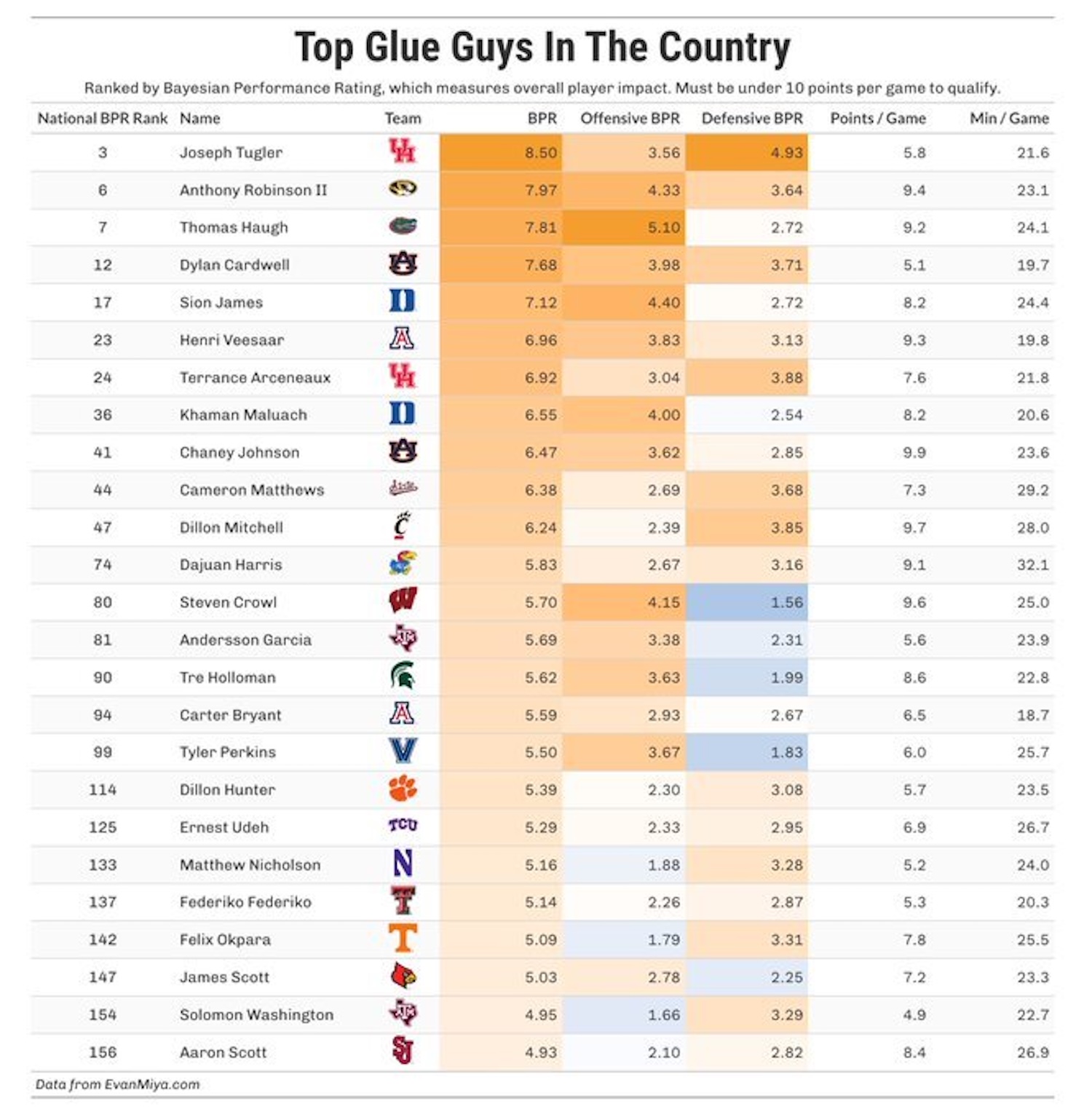
Dixon’s frustration spoke to the dynamic Tugler brings to the art of shot blocking: Now you don’t see him, now you do. Tugler ranks fourth in the U.S. in blocks percentage, according to KenPom, but he is one of only seven players in the top 50 who are shorter than 6-foot-9. He makes up for that, well, shortcoming with an otherwordly 7-foot-6-and-a-half wing span. When you combine those long arms with Tugler’s uncanny timing and vision, you have one of the most devastating defense weapons in all of college basketball. “It’s not how tall you are, it’s how tall you play,” Sampson says.
Tugler also ranks 25th nationally and third in the Big 12 in offensive rebound percentage. “His first jump and second jump are the same,” Sampson says. Most of all, Tugler has the quality that Glue Guys need most — namely, a willingness to do all the dirty work that leads to winning.
“Everybody’s got a role,” Tugler told me. “My job is to rebound. My scoring comes when I rebound the ball.” Adds Sampson, “He’s a sweetheart. He has no ego. I don’t know if I’ve ever heard him say ‘I’ or ‘me.’ It’s always ‘us.’ ”
Tugler grew up in Monroe, La., but moved with his family to Houston when he was in middle school. Sampson first saw him when he was a sophomore playing for the Houston Hoops grassroots team. “Jojo just flew around with those long arms,” Sampson recalls. “He was everywhere — dunked everything off the glass, ran the floor. He treated free throws like diptheria, but we knew he could play for us.”
Tugler was under the radar when he committed to Houston as a junior, but by the time he got there he was ranked No. 70 in the Recruiting Services Consensus Index. As a freshman, Tugler played 16.0 minutes per game and averaged 3.8 points, 4.1 rebounds and 1.1 blocks, but his season was cut short in late February when he broke his foot in practice and had to undergo surgery. He sat out the Cougars’ final nine games, including the four they played in the NCAA Tournament.
The biggest difference this season is that Tugler has learned to channel his frenetic energy. As a freshman, he committed 7.5 fouls per 40 minutes, per KenPom, but this season he is committing 5.8. “Last year he was all shotgun blasts, with 1,000 pellets going in 1,000 different directions. This year, he’s more like a rifle shot,” Sampson says. “I told him, coaching him is like adopting a coyote. He had a controlled wildness, but now he’s a puppy with a coyote spirit.”
Tugler is prepared to bring that spirit — and those long arms — to the Cougars’ efforts to get back to the Final Four. Having missed out on March Madness a year ago, he is eager to partcicipate, knowing full well that his ultimate goal is well within his reach. “I put in the work,” Tugler says. “If you put in the work, you should win the game. That’s how I look at it.”
Here are the other selections for the 2025 All-Glue Team, as well as a complete list of past selections:
Dylan Cardwell, 6-foot-11 senior center, Auburn
Like Tugler, Cardwell plays for a projected No. 1 seed but is an afterthought as a scorer. His 5.1 points per game ranks seventh on the team, but he is second in rebounds (4.9), second in blocks (1.5) and fourth in steals (0.8). He ranks second in the SEC in offensive rebound percentage and third in both block percentage and two-point percentage (71.1). He can legitimately guard all five positions, which makes him the ultimate switchable big man on defense. He ranks fourth in EvanMiya’s Glue Guy rankings.
“No one wants to be Dennis Rodman,” Cardwell recently told AL.com. “So, for me, I was like, ‘Man, Dennis Rodman’s a Hall of Famer, Draymond Green’s a Hall of Famer and man, why not pursue that path and just be the guy who does the dirty work?’”
Cardwell has been called the ultimate “Auburn Man” because he has played all five seasons there. He has been candid about the frustrations he felt following the arrival three years ago of Morehead State transfer Johni Broome, who has taken up a lot of Cardwell’s frontcourt minutes and shot opportunities. Cardwell has found a way not only to peacefully co-exist alongside Broome, but become an important asset. If the Tigers get back to the Final Four, Cardwell’s name won’t be in many headlines, but everyone inside the program will know they couldn’t have done it without him holding things together.
Alex Condon, 6-foot-11 sophomore forward, Florida
If you’ve ever watched Condon play and thought, “That guy would be great at Australian rules football,” you’re on to something. Condon grew up in Perth, Australia, as the son of a professional Australian rules football player. He played the sport growing up and was considered a high-level pro prospect, but Condon fell in love with basketball, where his length and bounce (not to mention his football-bred toughness and love of contact) translated well. So he enrolled at Australia’s Basketball Centre for Excellence, which is partnered with the NBA Global Academy.
Condon decided he needed to come to America to advance his game. He visited Florida in January 2023 and committed a few weeks later. In his eighth game as a freshman, he had 12 points and 16 rebounds, the most by a UF freshman since Al Horford in 2005. Gators coach Todd Golden called Condon “one of the hardest-playing dudes you’re going to find.” Though Condon ranked sixth on the team in minutes as a freshman (20.3 per game), he led the team in blocks (1.3), was second in the SEC in defensive rebound percentage and was named to the SEC’s All-Freshman team.
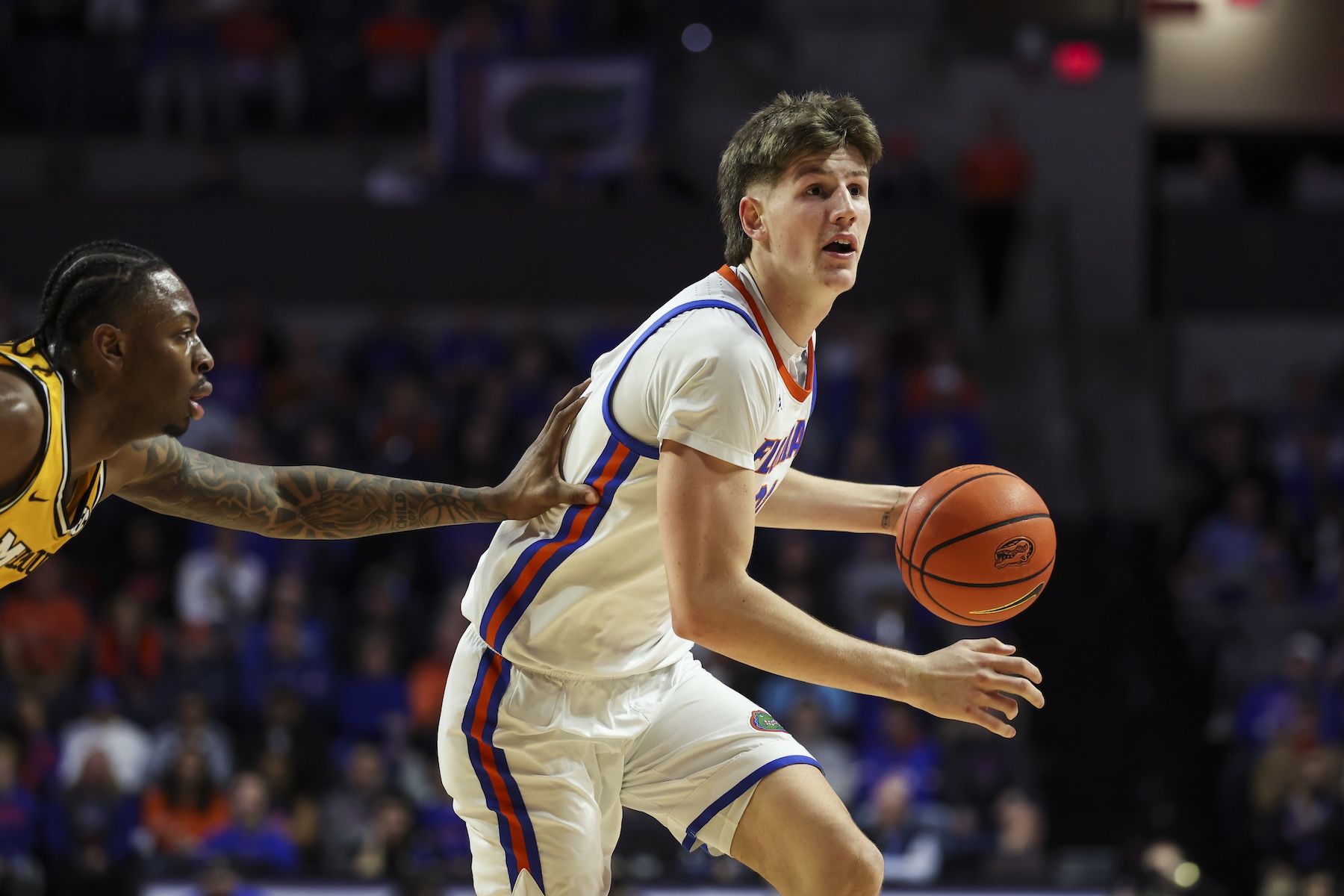
Condon has shown increased strength and discipline as a sophomore. He went from committing 5.1 fouls per 40 minutes to 3.3 and from drawing 4.4 per 40 minutes to 5.4. He ranks ninth in the SEC in defensive rebound percentage, 12th in offensive rebound percentage and 13th in blocks percentage. He leads the Gators in rebounds (7.7 per game) and ranks third in assists (2.3), and though he is fourth on the team in scoring at 11.1 points per game, Condon recently showed his offensive potential when he had a career-high 27 points (to go along with 10 rebounds and two blocks) in a 99-94 win at Alabama on March 5.
Condon’s aggression can be hazardous to his health. After missing four games with a sprained ankle, he returned for a Feb. 25 game at Georgia, only to have a couple of teeth dislodged by a wayward elbow thrown by Bulldogs forward R.J. Godfrey. He will wear a protective mouthguard for the remainder of the season, although it won’t change the way he plays. “My dad tells me all the time, ‘The harder you go in, the less likely you are to get hurt,’” Condon said. Spoken like a true Glue Guy.
Hayden Gray, 6-foot-4 senior guard, UC San. Diego
Gray is a San Diego native, yet UCSD coach Eric Olen thought he was too slight and slow to warrant a scholarship offer. Every other school in Division I felt the same way, so Gray opted for Division II Azusa Pacific, which is about 25 miles east of Los Angeles. Two years later, Olen’s starting point guard transferred to Boise State and he needed a defensive-oriented replacement. By that time Gray was a lot stronger and wiser, and he was ready to make the jump.
Now, Gray has been a critical piece on one of the top mid-major teams in America. The Tritons are 28-4 (18-2 Big West), they have won 13 straight games to capture the regular season title and they are ranked No. 35 in the NET, which puts them in excellent position to get an at-large bid to the NCAA Tournament should they fall in the Big West Tournament later this week. Gray is UCSD’s third-leading scorer at 10.9 points per game, but it is on defense where he excels. He leads the nation in steals (3.3 per game) and ranks second in steals percentage, per KenPom. On the season he has more than twice as many steals (104) as turnovers (44). He is also making a career-best 42.1 percent from three-point range.
“He’s really long, he has good physical tools, but he plays with a ton of anticipation,” Olen says. “He’s got that pattern recognition where he sees plays coming. What he does defensively fuels what we’re doing offensively. He makes other people better because he’s able to take on the toughest defensive assignments.”
Olen has smartly given Gray maximum leeway, not only to chase steals away from the man he is covering but to switch constantly on screens so he is always guarding the ball. “If I need him to play 40 minutes, he could play 40,” Olen says. “He’s super competitive. I’m never worried about whether he’s going to show up for us. He’s the hardest guy to take off the floor.”
Jahmai Mashack, 6-foot-4 senior guard, Tennessee
If it wasn’t the biggest shot in the history of Tennessee basketball, it was probably the most memorable. On March 1, as the clock was winding down on the No. 5 Vols’ home game against No. 6 Alabama, Mashack caught the inbounds pass, took four dribbles upcourt and, seeing no defender remotely close to him, launched a 35-foot shot that rattled home at the buzzer. That gave the Vols a dramatic 79-76 win.
The Shot, as it will forever be known, was noteworthy for many reasons, not the least of which was how unlikely it was that Mashack would have been the one to take it, given that he only attempts 1.4 threes per game. (That’s why he was so open.) As Tennessee’s sixth-leading scorer at 6.0 points per game, Mashack’s contributions usually go unnoticed, but everyone saw this one. He finished the game with a vintage Glue Guy stat line: 11 points, 6 rebounds, 3 assists, 2 steals, 1 turnover in 34 minutes. And one very big win.
But what’s most significant about The Shot is that it wouldn’t have happened but for several critical plays Mashack made beforehand. He chased down an offensive rebound off a missed free throw by teammate Chaz Lanier, got fouled and then buried both free throws to tie the score with 30.3 seconds remaining. Then, with 3.8 on the clock, Mashack forced a held ball on an Alabama inbounds play. Tennessee owned the possession arrow, which in turn set up the decisive bucket.
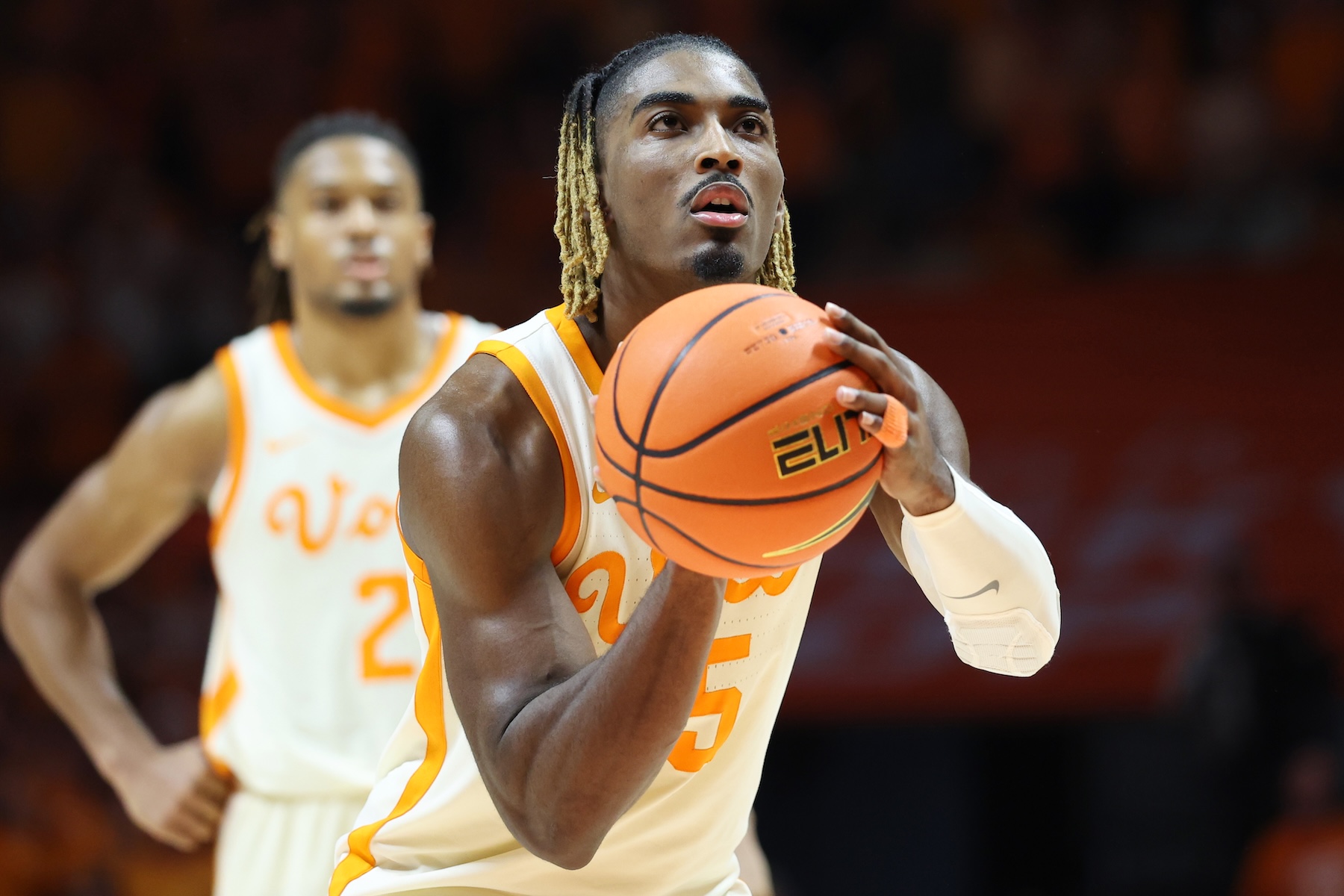
It was a remarkable sequence for a remarkable player — and person. “I’m happy for Jahmai,” Barnes said afterward. “He’s just been an incredible everything. He exemplifies everything that you want in a player and a person. He had never been in the position that he was today, but with his basketball IQ, he saw it, he shot it, and I’m glad he did.”
Basketball-wise, Mashack does a little bit of everything for Tennessee. He averages 4.1 rebounds, 1.6 steals, 1.4 assists and 0.6 blocks. Off the court, he is Citizen Jahmai. For the last two years, Mashack has served as chairman of the SEC Men’s Basketball Leadership Council and was selected by his peers to represent the SEC on the NCAA Oversight Committee’s Student-Athlete Engagement Group. He is also very active helpiing charities like Second Harvest Food Bank in East Tennessee, for which he has raised over $1 million.
Mashack’s defensive prowess comes through extensive study, both with video and scouting reports. His offensive limitations have drawn annoyance at times from Tennessee fans, but the Vols’ true faithful understand just how much Mashack means to this program. “It’s something that goes beyond analytics. It’s something that goes beyond the stat sheet,” Mashack said. “Getting those extra possessions are plays that I always make, and I think it’s a big thing for guys to trust their eyes and not analytics the whole time, because you can find whatever stat you want to have an opinion about. [The fans] know who I am, how hard I play and what I do to create extra possessions and shots for others.”
Anthony Robinson, 6-foot-3 sophomore guard, Missouri
Missouri coach Dennis Gates spent eight years as an assistant at Florida State, so he was familiar with Robinson, who played for former Seminoles great (and Heisman Trophy winner) Charlie Ward at Florida State University High School, where Robinson won a state championship as a senior. Robinson was considered a three-star prospect (he was ranked No. 194 in his class by 247Sports), but Gates thought he would fit perfectly into Missouri’s up-tempo, intensely pressurized attack. “He was scawny, but he played bigger than he was,” Gates recalls. “He was just a pesky defender. His athleticism and quickness were elite.”
Robinson ranks No. 2 in EvanMiya’s Glue Guy rankings, but like many freshmen, he had difficulty adjusting to the physicality of the SEC. Heading into this season, Gates challenged Robinson to elevate not only his decision-making but his leadership as well. He named Robinson an underclassman captain, which means next year Robinson will be a full team captain. “His personality lights up a room,” Gates says. “If his teammates need a laugh, he can give them that. If they need some words of wisdom, he can give them that. If they need a fire in their belly, he can ignite that.”
Earlier this season, Gates called out Robinson publicly for not living up to his potential. Since that time, Missouri has climbed to No. 14 in the AP poll, although that has come down during a recent losing streak. Robinson ranks fourth on Missouri in scoring (9.4 points per game) but leads the team in steals (2.1), assists (3.5) and three-point percentage (43.5). Robinson also ranks No. 9 nationally in steals percentage, per KenPom, and he is eighth in the SEC in assist rate.
Robinson has taken the biggest step forward with respect to his outside shooting. He made just nine threes as a freshman on 20.5 percent shooting but has converted 41.7 percent as a sophomore. That shows he is capable of scoring more than he does and probably will next season. For the time being, he’s content to play his role — and keep winning. “He’s our Glue Guy because of the way he connects the dots,” Gates says. “He covers up everyone’s weaknesses. We’re going to need him to be at his best in the postseason.”
PAST ALL-GLUE TEAMS
2024: J’Wan Roberts, Houston (captain); Stevie Mitchell, Marquette; Robert Jones, Iowa State; Mason Gillis, Purdue; Josiah-Jordan James, Tennessee; Chad Baker-Mazara, Auburn
2023: Kevin McCullar, Kansas (captain); Trey Galloway, Indiana; Andre Jackson, UConn; Stevie Mitchell, Marquette; Jamal Shead, Houston; Anton Watson, Gonzaga
2022: Dalen Terry, Arizona (captain); Justin Minaya, Providence; Paul Mulcahy, Rutgers; Tyler Wahl, Wisconsin; Da’Monte Williams, Illinois; Jaylin Williams, Arkansas
2021: Herb Jones, Alabama (captain); Trent Frazier, Illinois; Marcus Garrett, Kansas; DeJon Jarreau, Houston; Justin Smith, Arkansas; Mark Vital, Baylor
2020: Mark Vital, Baylor (captain); K.J. Feagin, San Diego State; Andres Feliz, Illinois; Marcus Garrett, Kansas; Trey Landers, Dayton; Darryl Morsell, Maryland
2019: Zavier Simpson, Michigan, and Matisse Thybulle, Washington (co-captains); Zylan Cheatham, Arizona State; Nojel Eastern, Purdue; Trent Forrest, Florida State; Ashton Hagans, Kentucky; Galen Robinson, Houston
2018: Theo Pinson, North Carolina (captain); Isaiah Wilkins, Virginia; Rashard Kelly, Wichita State; Rawle Alkins, Arizona; Dakota Mathias, Purdue; Silas Melson, Gonzaga
2017: Jordan Bell, Oregon (captain); Landen Lucas, Kansas; Dakota Mathias, Purdue; Ben Moore, SMU; Nathan Adrian, West Virginia; Isaiah Briscoe, Kentucky
2016: Matt Costello, Michigan State (captain); James Farr, Xavier; Landen Lucas, Kansas; Kaleb Tarczewski, Arizona; Raphael Davis, Purdue; Marshall Plumlee, Duke
2015: Rico Gathers, Baylor (captain); Alex Barlow, Butler; Josh Gasser, Wisconsin; Dustin Hogue, Iowa State; Tekele Cotton, Wichita State; Raphael Davis, Purdue; Briante Weber, VCU (honorary member)
2014: Patric Young, Florida (captain); Tekele Cotton, Wichita State; Josh Gasser, Wisconsin; Justin Jackson, Cincinnati; T.J. McConnell, Arizona; Akil Mitchell, Virginia
2013: Mike Hart, Gonzaga (captain); Kyle Anderson, UCLA; Melvin Ejim, Iowa State; Roosevelt Jones, Butler; Nate Lubick, Georgetown; Travis Releford, Kansas
2012: Darius Miller, Kentucky (captain); Quincy Acy, Baylor; Travis Releford, Kansas; Toure’ Murry, Wichita State; Anthony Marshall, UNLV; Jorge Gutierrez, Cal; Zack Novak, Michigan
2011: Tyrone Nash and Carleton Scott, Notre Dame (co-captains); Terrell Bell, Virginia Tech; Brady Morningstar, Kansas; Draymond Green, Michigan State; Zack Novak, Michigan
2010: David Lighty, Ohio State (captain); Chris Kramer, Purdue; Reggie Redding, Villanova; Willie Veasley, Butler; Rick Jackson, Syracuse
2009: J.T. Tiller, Missouri (captain); Taylor Griffin, Oklahoma; Jermaine Dixon, Pitt; Garrett Temple, LSU; Travis Walton, Michigan State
2008: Stanley Burrell, Xavier (captain); Tory Jackson, Notre Dame; Dave Pendergraft, Gonzaga; Derrick Jasper, Kentucky; Justin Mason, Texas; Wisconsin Badgers (team)
2007: Dane Bradshaw, Tennessee (captain); Kyle Shiloh, Nevada; Dominique Kirk, Texas A&M; Othello Hunter, Ohio State; Marcus Landry, Wisconsin
2006: Sean Dockery, Duke (captain); Dane Bradshaw, Tennessee; Mike Hall, George Washington; Sean Marshall, Boston College; Luc Richard Mbah a Moute, UCLA; Kenton Paulino, Texas
2005: Jamaal Levy, Wake Forest (captain); Louis Hinnant, Boston College; Erroll Knight, Gonzaga; Christian Moody, Kansas; Ellis Myles, Louisville; Roger Powell, Illinois
2004: Jaron Brown, Pittsburgh (captain); Tyrone Barley, Saint Joseph’s; Erroll Knight, Gonzaga; Roger Powell, Illinois; Nick Robinson, Stanford; Robert Tomaszek, Texas Tech
2003: Rick Anderson, Arizona (captain); Jaron Brown, Pittsburgh; Justin Hamilton, Florida; Chuck Hayes, Kentucky; Robert Johnson, Oregon; Ellis Myles, Louisville; Tony Robertson, Connecticut
2002: Gerald Fitch, Kentucky (captain); Dahntay Jones, Duke; Billy Knight, UCLA; Byron Mouton, Maryland; Jarrad Odle, Indiana; Antoine Pettway, Alabama
2001: Sergio McClain, Illinois (captain); Nate James, Duke; Luke Walton, Arizona; Justin Hamilton, Florida; Marcus Toney-El, Seton Hall; Jason Capel, North Carolina
2000: Lavor Postell, St. John’s (captain); Alex Jensen, Utah; Nate James, Duke; Brian Beshara, LSU; Stevie Johnson, Iowa State


